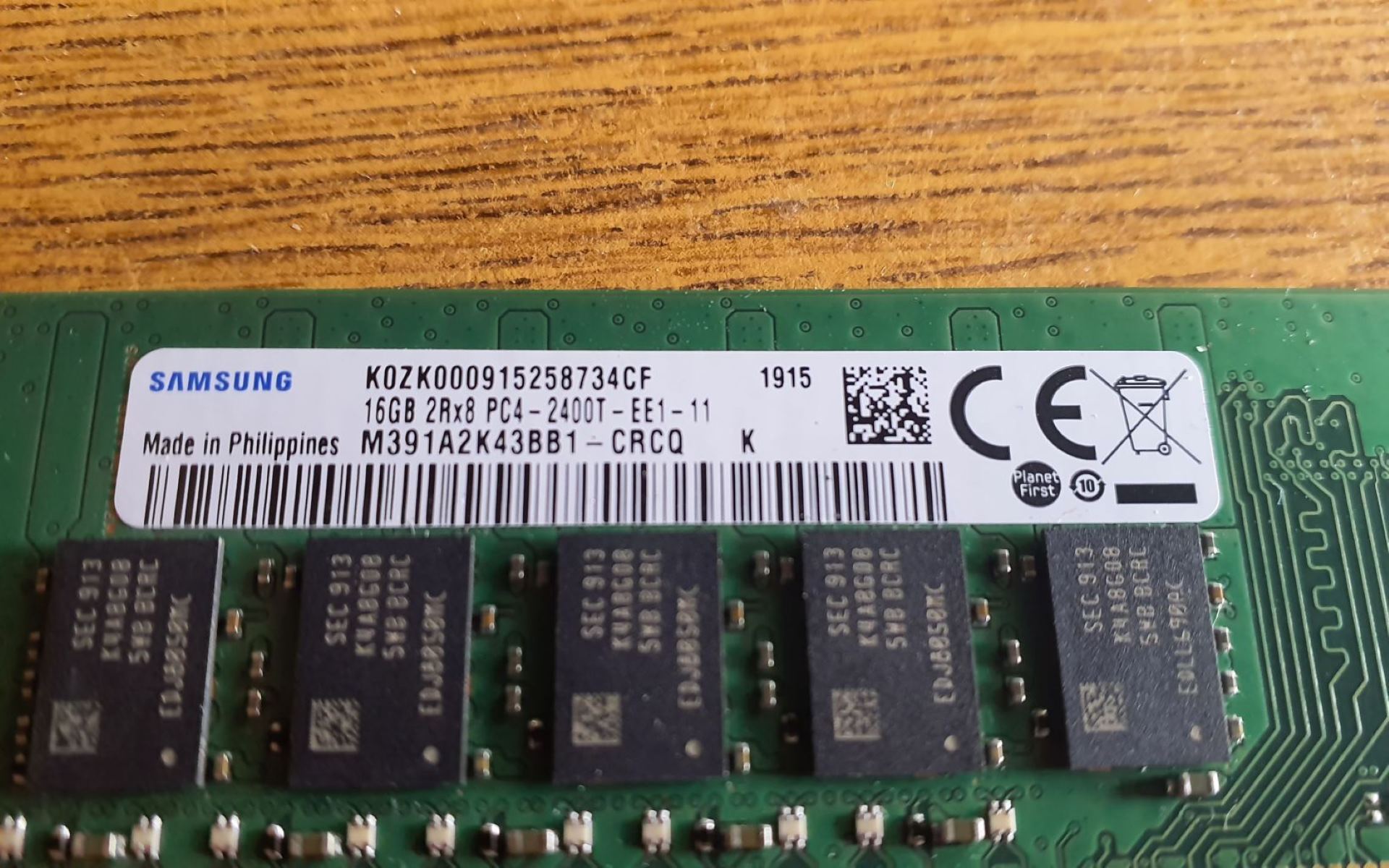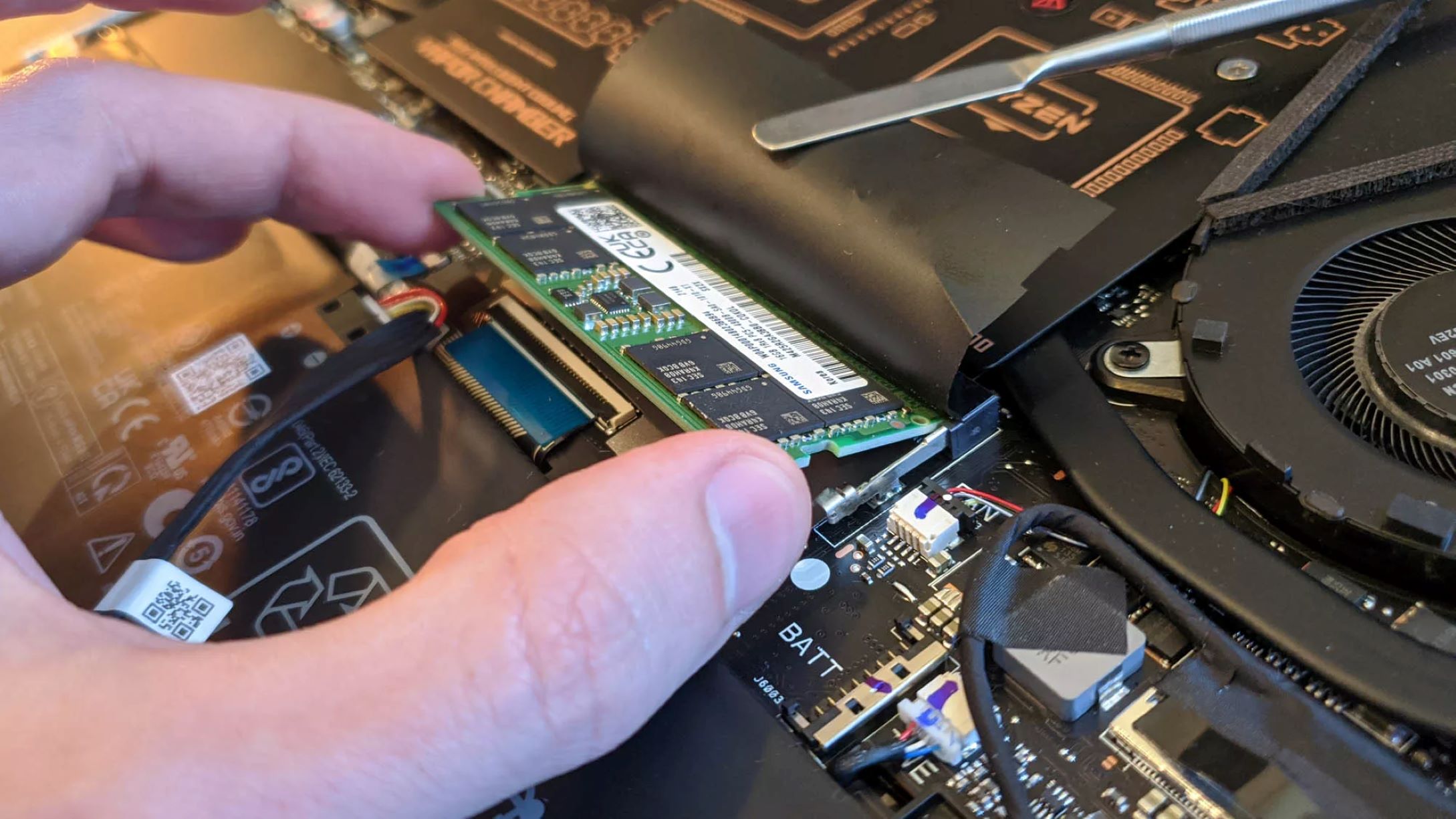Introduction
When it comes to optimizing the performance and efficiency of your computer, RAM (Random Access Memory) plays a crucial role. RAM is the temporary storage space that allows your computer to quickly access and manipulate data while you are using it. The more RAM your computer has, the more smoothly it can handle multiple tasks and applications simultaneously.
In recent years, 16GB RAM has emerged as a popular choice for many computer users, offering a balance between affordability and performance. In this article, we will delve into what exactly 16GB RAM is, how it functions, and the benefits it brings to your computing experience.
Whether you are a casual user who enjoys browsing the internet and streaming videos or a power user who engages in resource-intensive tasks such as video editing or gaming, understanding the significance of 16GB RAM can help you make informed decisions about your computer’s memory requirements.
We will explore the advantages, potential drawbacks, and whether 16GB RAM is sufficient for your needs. We will also discuss the possibility of upgrading to 16GB RAM if you are currently running on a lower capacity.
Join us as we unravel the mysteries of 16GB RAM and discover how this memory size can enhance your computing experience.
Definition of 16GB RAM
Before delving into the benefits of 16GB RAM, let’s understand what exactly this specification refers to. RAM, or Random Access Memory, is a type of computer memory that stores data that is currently being used or processed by the computer’s CPU (Central Processing Unit).
The “16GB” in 16GB RAM refers to the amount of memory capacity that is available for the computer to use. In this case, “GB” stands for gigabytes, a unit of measurement for digital storage. 16GB RAM means that your computer has 16 gigabytes of RAM available for immediate access.
Having 16GB of RAM allows your computer to handle a wide range of tasks and applications efficiently. It provides ample memory space for running multiple applications simultaneously without experiencing performance issues or slowdowns. This capacity is especially beneficial for resource-intensive activities such as video editing, gaming, or running virtual machines.
It’s important to note that the capacity of RAM does not directly impact the speed of your computer; rather, it determines the amount of data that your computer can hold and access at any given time. The speed of RAM is measured in megahertz (MHz) and is a separate specification.
Therefore, when you see a computer or device advertised with 16GB RAM, it means that it has a significant amount of memory available for quick and efficient data processing, resulting in improved overall performance.
How does RAM work?
To understand the significance of 16GB RAM, it’s important to have a basic understanding of how RAM works in your computer.
RAM acts as a temporary storage space for data that the computer needs to access quickly. When you open an application or perform a task, the necessary data is transferred from the computer’s storage drive (such as an SSD or HDD) to the RAM. This data includes instructions for the CPU to execute and the necessary data for the task at hand.
Unlike a storage drive, such as a hard disk, RAM allows for much faster data access. This is because RAM uses integrated circuits to store and retrieve data electronically, offering significantly quicker performance compared to mechanical drives.
When you have more RAM available, your computer can store more data in this temporary space, which allows for smoother multitasking and faster access to frequently used information. This is especially important when running resource-intensive applications or working with large files.
Think of RAM as a desk space where you can place your current tasks and files for easy access. The larger the desk space (in this case, RAM capacity), the more tasks you can handle simultaneously without having to constantly retrieve information from the computer’s storage drive.
If your computer doesn’t have enough RAM to accommodate all the tasks and applications you are running, it will resort to using virtual memory, which is a portion of the hard disk dedicated to emulating RAM. However, this process is much slower, as accessing data from the hard disk takes a longer time than accessing it from RAM.
Having 16GB of RAM allows your computer to store a significant amount of data, making it easier and faster for the CPU to access and manipulate that data. As a result, you can enjoy a smoother overall computing experience with improved performance and reduced lag.
Benefits of having 16GB RAM
Having 16GB of RAM offers numerous benefits that can enhance your computing experience. Let’s explore some of the key advantages:
- Improved multitasking: With 16GB RAM, you can smoothly run multiple applications simultaneously without experiencing performance issues. Whether you’re working on multiple projects, browsing the web while streaming media, or running resource-intensive programs, 16GB RAM provides ample memory space to handle these tasks efficiently.
- Enhanced performance: More RAM means more data can be stored in memory, reducing the need to constantly retrieve information from the slower storage drive. This leads to faster access times and quicker application loading. Tasks such as opening large files, editing high-resolution media, or running complex software will benefit from the increased memory capacity, resulting in improved performance and responsiveness.
- Smooth gaming experience: Gamers will appreciate the benefits of 16GB RAM, as it allows for smooth gameplay with higher frame rates and reduced lag. Many modern games require a significant amount of memory to run efficiently, and 16GB of RAM ensures that your computer has enough resources to handle the demanding graphics and processing requirements of today’s games.
- Efficient virtual machine usage: If you’re running virtual machines on your computer, 16GB of RAM is essential. Virtual machines require considerable memory to function properly, especially when running multiple instances simultaneously. With 16GB RAM, you can allocate sufficient memory to each virtual machine, ensuring smooth operation and preventing performance bottlenecks.
- Future-proofing: As technology advances and software becomes more demanding, having 16GB of RAM provides a level of future-proofing for your computer. It allows you to comfortably handle the increased memory requirements of future applications and operating systems without the need for immediate upgrades.
These benefits make 16GB RAM a versatile choice for a wide range of users, from casual computer users who multitask regularly to professionals who require sufficient memory for resource-intensive tasks. Whether you’re a student, professional, gamer, or creative individual, 16GB RAM offers a balance between affordability and performance, ensuring that your computer can handle the tasks you throw at it with ease.
Is 16GB RAM enough?
Whether 16GB of RAM is enough for your needs depends on your specific usage requirements and the type of tasks you perform on your computer. For many users, 16GB RAM provides a sufficient amount of memory to handle a wide range of tasks. However, it’s worth considering a few factors before determining if 16GB RAM is the right choice for you.
1. Usage type: If you primarily use your computer for everyday tasks such as web browsing, email, word processing, and media consumption, 16GB RAM is more than enough. These activities do not typically require a significant amount of memory to run smoothly, and 16GB provides a comfortable buffer for multitasking.
2. Resource-intensive tasks: If you engage in resource-intensive activities such as professional video editing, 3D rendering, or running complex software, you may benefit from having more than 16GB of RAM. These tasks tend to consume a substantial amount of memory, and having additional RAM allows for smoother and more efficient processing.
3. Gaming: Gamers often demand a higher amount of RAM to ensure a seamless gaming experience. While 16GB RAM is generally sufficient for most games, some newer titles and graphically intensive games may benefit from having more memory available. Additionally, if you also stream your gameplay or run other background applications while gaming, having extra RAM will help maintain smooth performance.
4. Virtualization: If you frequently use virtual machine software or work with multiple virtual machines simultaneously, having 16GB RAM may be the minimum requirement. Running virtual machines can potentially consume a significant portion of your memory, and having more RAM available ensures optimal performance and reduces the risk of performance degradation.
Ultimately, the decision of whether 16GB RAM is enough depends on your personal computing needs and usage patterns. It’s always a good idea to assess your specific requirements and consider potential future needs when deciding on the appropriate amount of RAM for your computer. If you find that your computer is frequently reaching its memory limit or you anticipate growth in your usage demands, upgrading to a higher memory capacity may be worth considering.
Performance improvements with 16GB RAM
Upgrading to 16GB of RAM can have a significant impact on the overall performance of your computer. Let’s explore some of the key performance improvements that you can expect with this increased memory capacity:
- Efficient multitasking: With 16GB RAM, you can seamlessly run multiple applications simultaneously without experiencing performance bottlenecks. You’ll be able to switch between tasks smoothly, ensuring that your computer doesn’t slow down or become unresponsive when handling various applications at once.
- Faster application loading: The increased memory capacity allows your computer to store a larger amount of frequently accessed data in RAM. As a result, applications load faster, reducing the time you spend waiting for programs to open or respond to your commands.
- Improved responsiveness: 16GB RAM enables your computer to quickly access and manipulate data, resulting in a more responsive computing experience. This is particularly noticeable when performing tasks such as searching for files, navigating through large documents, or working with complex spreadsheets.
- Smooth gaming experience: Gamers will see a noticeable improvement in their gaming experience with 16GB of RAM. The enhanced memory capacity allows for faster rendering of graphics, reduced stuttering, and improved overall frame rates, providing a more immersive and enjoyable gaming session.
- Enhanced multimedia editing: Whether you’re editing photos, videos, or audio files, 16GB RAM provides the necessary resources to handle resource-intensive multimedia editing. You’ll experience faster rendering times, smoother playback, and seamless editing, allowing you to work efficiently and bring your creative projects to life.
- Improved virtual machine performance: If you use virtualization software or run virtual machines on your computer, 16GB RAM is crucial for optimal performance. The increased memory capacity provides the necessary resources for smooth operation, preventing virtual machines from slowing down or becoming unresponsive.
These performance improvements make 16GB of RAM a valuable upgrade for a wide range of users. Whether you’re a professional, student, gamer, or creative individual, the enhanced memory capacity ensures that your computer can handle resource-intensive tasks with ease, providing a smoother and more efficient computing experience.
Upgrading to 16GB RAM
If you’re currently running on a lower capacity of RAM and considering upgrading to 16GB, there are a few things to keep in mind. Here’s a closer look at the process and potential benefits of upgrading:
1. Compatibility: Check the compatibility of your computer’s motherboard and operating system with 16GB RAM. Ensure that your motherboard supports the type and speed of RAM you plan to install. It’s also essential to ensure that your operating system can recognize and utilize the full capacity of 16GB RAM.
2. Purchase the appropriate RAM: Identify the type, speed, and format of RAM required for your computer. Consult your computer’s manual, visit the manufacturer’s website, or use system analysis tools to determine the specific RAM specifications you need. Purchase RAM modules from reputable brands or trusted retailers to ensure compatibility and reliability.
3. Install the RAM modules: Upgrading your computer’s RAM is relatively straightforward. First, power off your computer and disconnect it from any power source. Locate the RAM slots on your motherboard and remove the existing RAM modules (if necessary). Insert the new 16GB RAM modules into the available slots, ensuring a secure connection. Power on your computer, and it should recognize the new RAM capacity automatically.
4. Verify the RAM upgrade: After installing the 16GB RAM, verify that your computer recognizes and is utilizing the full capacity. Check your computer’s system settings or use diagnostic tools to confirm that the upgrade was successful and the new RAM is functioning correctly.
5. Enjoy the benefits: With 16GB RAM installed, you’ll experience improved overall performance, faster multitasking, smoother application loading, and enhanced responsiveness. Whether you’re a power user, gamer, or creative professional, the increased memory capacity will provide a noticeable boost to your computing experience.
Upgrading to 16GB RAM is an effective way to extend the lifespan and performance capabilities of your computer. Not only will it allow for better multitasking and smoother operation of resource-intensive tasks, but it also offers a level of future-proofing for upcoming software and operating system requirements. Take the time to research and ensure compatibility before upgrading, and enjoy the benefits of a more powerful and efficient computing experience.
Potential drawbacks of 16GB RAM
While there are significant benefits to upgrading to 16GB RAM, it’s important to consider potential drawbacks as well. Here are a few factors to keep in mind:
- Cost: Upgrading to 16GB RAM can involve a significant investment, especially if you need to replace all existing RAM modules. The cost of RAM can vary depending on factors such as brand, speed, and type. Be prepared for the potential expense associated with upgrading.
- Compatibility limitations: Some older or budget-end computers may have limitations on the amount of RAM they can support. Before upgrading to 16GB RAM, ensure that your computer’s motherboard and operating system can handle the increased capacity. It’s advisable to consult the computer’s manual, check the manufacturer’s specifications, or seek professional advice to ensure compatibility.
- Inefficient utilization: If you primarily use your computer for everyday tasks such as web browsing, email, and word processing, you may not fully utilize all 16GB of RAM. In such cases, the additional memory capacity may not provide significant performance improvements compared to lower RAM capacities.
- Operating system limitations: Older operating systems, particularly 32-bit versions, may have restrictions on the amount of RAM they can recognize and utilize. Ensure that your operating system is 64-bit and capable of handling 16GB RAM to avoid potential compatibility issues and wasted memory capacity.
- Diminishing returns in some use cases: While 16GB RAM is generally sufficient for most users, certain resource-intensive tasks, such as professional video editing or running multiple virtual machines, may benefit from even higher RAM capacities. If you engage in such activities, you may encounter limitations with 16GB RAM, and further upgrades may be necessary.
It’s important to weigh these potential drawbacks against the benefits and your specific computing needs. Consider factors such as your budget, the compatibility of your computer, and the type of tasks you regularly perform. Assess whether the advantages of 16GB RAM align with your requirements, or if a different RAM configuration may be more suitable.
While there are potential drawbacks, 16GB RAM remains a popular and versatile choice for many users, providing a balance between cost, performance, and future-proofing. Evaluate your needs and make an informed decision that aligns with your computing requirements and budget limitations.
Conclusion
Upgrading to 16GB RAM can have a significant impact on your computer’s performance and multitasking capabilities. With its increased memory capacity, 16GB RAM enables smoother operation, faster application loading, and improved overall responsiveness. Whether you’re a casual user, gamer, or professional, the benefits of 16GB RAM are evident.
While there are potential drawbacks to consider, such as the cost of the upgrade and compatibility limitations, these factors can be mitigated through research and careful consideration. Ensure that your computer’s motherboard and operating system are compatible with 16GB RAM, and evaluate your specific needs and usage patterns before deciding on an upgrade.
For most users, 16GB RAM strikes a balance between affordability and optimal performance. It provides ample memory capacity to handle everyday tasks, resource-intensive applications, and demanding gaming experiences. Additionally, 16GB RAM offers a level of future-proofing that allows your computer to meet the requirements of upcoming software and operating systems.
Ultimately, the decision to upgrade to 16GB RAM should be based on your computing needs and budget. Assess the tasks you regularly perform and consider the potential benefits and limitations of 16GB RAM in relation to your specific usage requirements.
By understanding the significance of 16GB RAM and its impact on your computer’s performance, you can make an informed decision that enhances your computing experience. Whether you choose to upgrade now or in the future, 16GB RAM can unlock new levels of efficiency and productivity, ensuring that your computer meets the demands of today’s technology-driven world.

























